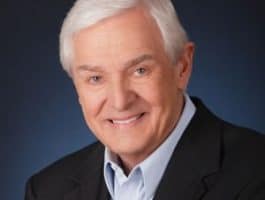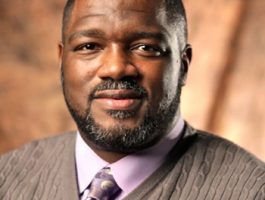
Being a Strong, Effective Father
What kind of dad are you? Learn principles for being a strong, effective father from Voddie Baucham, Robert Lewis, David Jeremiah, and Dr. Meg Meeker.
Show Notes
About the Host
About the Guest
-
What kind of dad are you? Learn principles for being a strong, effective father from Voddie Baucham, Robert Lewis, David Jeremiah, and Dr. Meg Meeker.
-
Dave and Ann Wilson
Dave and Ann Wilson are hosts of FamilyLife Today®, FamilyLife’s nationally-syndicated radio program. Dave and Ann have been married for more than 38 years and have spent the last 33 teaching and mentoring couples and parents across the country. They have been featured speakers at FamilyLife’s Weekend to Remember® marriage getaway since 1993 and have also hosted their own marriage conferences across the country. Cofounders of Kensington Church—a national, multicampus church that hosts more than 14,000 visitors every weekend—the Wilsons are the creative force behind DVD teaching series Rock Your Marriage and The Survival Guide To Parenting, as well as authors of the recently released book Vertical Marriage (Zondervan, 2019). Dave is a graduate of the International School of Theology, where he received a Master of Divinity degree. A Ball State University Hall of Fame quarterback, Dave served the Detroit Lions as chaplain for 33 years. Ann attended the University of Kentucky. She has been active alongside Dave in ministry as a speaker, writer, small-group leader, and mentor to countless wives of professional athletes. The Wilsons live in the Detroit area. They have three grown sons, CJ, Austin, and Cody, three daughters-in-law, and a growing number of grandchildren.
-

David Jeremiah
Dr. David Jeremiah is the senior pastor of Shadow Mountain Community Church in El Cajon, California, and chancellor of San Diego Christian College. He is also the founder of Turning Point, a ministry committed to providing sound Bible teaching through national radio and television broadcasting. Dr. Jeremiah has authored numerous books, including the best-selling "Captured by Grace," "Life Wide Open," "My Heart's Desire," and "Sanctuary."
Meg Meeker
Dr. Meg Meeker is a pediatrician who has practiced child and adolescent medicine for 31 years and is an author of six books including the best-selling book, Strong Fathers, Strong Daughters; Strong Mothers, Strong Sons, The Ten Habits of Happy Mothers and more. She is a nationally acclaimed speaker on parenting issues and speaks at Dave Ramsey’s Smart Conference. She has appeared on numerous national television and radio shows including The Today Show, NPR, Today with Kathie Lee a...more
Robert Lewis
Robert Lewis has been a pastor, writer, speaker, and visionary for over forty years. Robert founded the original Men’s Fraternity and developed the Men’s Fraternity curriculum in 1990 while serving as Teaching Pastor and Directional Leader at Fellowship Bible Church in Little Rock, Arkansas. Robert was named Pastor of the Year by the National Coalition of Men’s Ministry in recognition for his efforts to help men discover Authentic Manhood. Graduating from the University of Arka...more
Voddie Baucham
Voddie Baucham wears many hats. He is a husband, father, former pastor, author, professor, conference speaker, and church planter. He currently serves as Dean of Theology at African Christian University in Lusaka, Zambia. Dr. Baucham holds degrees from Houston Baptist University (BA in Christianity/BA in Sociology), Southwestern Baptist Theological Seminary (M.Div.), Southeastern Baptist Theological Seminary (D.Min.), an honorary degree from Southern California Seminary (D.D.), and additional...more
What kind of dad are you? Learn principles for being a strong, effective father from Voddie Baucham, Robert Lewis, David Jeremiah, and Dr. Meg Meeker.
Being a Strong, Effective Father
Bob: Dr. Meg Meeker remembers a time when she was in college—she realized that her dad had not stopped being her dad.
Meg: I got home very late, and my dad was waiting up. That gentleman dropped me off, and my dad ran out and just said to him that he was in no uncertain terms not allowed back near our home. Now, this was what my dad said to me: “I know you’re off at college doing whatever you want to do—you’re there / you’re responsible. But when you come home, it’s our rules; because it’s still our home.”
Bob: This is FamilyLife Today for Monday, June 12th. Our host is the President of FamilyLife®, Dennis Rainey, and I’m Bob Lepine. Kids don’t always like it when a dad does what dads ought to do—at least, not in the moment—but years later, they see how much they benefit from dad being a dad. Stay with us.
1:00
Bob: And welcome to FamilyLife Today. Thanks for joining us. This is the time of year when we celebrate the impact dads have on the family. It does feel a little bit like Father’s Day doesn’t get quite the attention Mother’s Day gets; don’t you think?
Dennis: Well, come on, Bob! How can I answer that question? [Laughter] I mean, there’s nothing like a mom and a mom’s love; but I have to say this—the older I get, the more I appreciate my own dad’s impact on my life and the importance of every man, who’s listening to our voices today—the impact for good or for not-so-good in the life of your children, the life of your wife / your partner in parenting, and then, your community.
2:00
I mean, dads really set—they set a course. When they don’t set a course, usually, the outcome is not a good outcome.
Bob: You know, it does occur to me that one of the reasons Mother’s Day probably gets more attention is because, in most families, kids spend a lot more time with mom—
Dennis: They do.
Bob: —than they do with dad. That doesn’t mean that the time they spend with dad is inconsequential or insignificant. In fact, it can be profound and powerful. One of the people we’ve heard from over the years—and today, we’re going to be hearing from different folks, who have been guests on FamilyLife Today / who have spoken at our events over the years—
Dennis: We’re doing that because this is our 25th birthday of FamilyLife Today. We just want to celebrate God’s goodness for a quarter of a century and allow our listeners to kind of celebrate the silver with us.
Bob: Yes; the birthday celebration comes up in November; but here, in advance, we thought we’d just look back and hear some of the voices we’ve heard over the years.
3:00
One of the people we’ve had as a guest on FamilyLife Today, and a person who has spoken at a number of events we’ve had, talking about how profound a father’s role is, is Voddie Baucham. Voddie, today, gives leadership to a seminary in Africa. For a number of years, he was a pastor in Houston, Texas.
Dennis: And, as our listeners have heard Voddie on the broadcast before—he’s a straight shooter.
Bob: Yes.
Dennis: There’s nothing unclear about what you’re about to hear him say.
[Recorded Message]
Voddie: George Whitfield: “Every governor of a family ought to look upon himself as obliged to act in three capacities: as a prophet to instruct; as a priest to pray for and with; and as king to govern, direct, and provide for them.” What does a man need to know in order to function in this particular area? He needs to understand the gospel; he needs to understand evangelism; and he needs to understand discipleship.
What is the gospel? The gospel is the good news!
4:00
It is the good news of what God has done, through the person and work of Jesus Christ, to redeem lost and sinful men through His death, burial, and resurrection—as a substitutionary, vicarious death—that satisfies the righteous wrath of a holy God on behalf of sinners who can be saved and forgiven no other way. That’s what the gospel is—it’s something we proclaim.
What does the gospel require? The gospel requires repentance and faith—period! “Whoa! You can’t just live any way you want to live! There’s got to be some obedience in there!” Yes; that’s what the gospel produces. If you confuse what the gospel produces and what the gospel requires, you end up in works-based righteousness; because now you’re trying to accomplish, in and of yourself, that which only God accomplishes through the gospel.
5:00
You’ve got to understand the fallen nature of man if you’re going to do evangelism. You’ve got to understand the fallen nature of your children. A man cannot do evangelism properly within the context and confines of his home if he doesn’t know the fallen nature of his children. Otherwise, if he doesn’t understand the fallen nature of his children, then he thinks that his children just need some good habits: “If I just get these good habits into my children, then they’ll grow up and be good, godly kids; because they’ll do the right thing.” But, if you understand the fallen nature of your children, you understand that they don’t just need good habits—they need a new nature.
Let’s go to the next part of this—discipleship: “Children, obey your parents in the Lord, for this is right,” “Honor your father and mother, which is the first commandment with a promise, that it may go well with you and that you may live long in the land,” “Fathers, do not provoke your children to anger, but bring them up in the discipline and instruction of the Lord.”
6:00
This, of course, is based on the mandate in Deuteronomy, Chapter 6. We have an obligation to disciple our children. There is nothing in the Scriptures—there is nothing anywhere in the Scriptures—that puts the responsibility of the discipleship of children on any person other than parents and grandparents—nowhere else in the Bible! You’ll never find youth pastors in the Bible discipling kids / children’s ministers in the Bible discipling kids—you’re not going to find that. It’s not there! It doesn’t exist! It’s not there! The obligation / the command is given to parents.
[Studio]
Bob: Well, again, that’s Voddie Baucham laying a pretty heavy spiritual foundation. I mean, when it comes right down to it, there’s a lot that a father is responsible for; but this is at the base of all of it; don’t you think?
Dennis: I do. If you go to Deuteronomy 6, it makes it clear that, when a dad gets up in the morning, he is to feel the weight of this spiritual responsibility for directing his children / for equipping his children in knowing how to do life—
7:00
—for skillfully training his children to know how to relate to the opposite sex / how to relate to each other, as siblings. This is a man’s responsibility—it’s not just the mom’s responsibility. A dad’s got to be in there, training, equipping, coaching, encouraging, and putting his arm around a child when he sees one of them fail—letting him know there’s grace for our failures and giving him wisdom to know how to handle his failures and not quit / not give up. A dad is really important to children not losing heart in well-doing.
Bob: Some dads hear this, and they think to themselves: “I can’t do this! I mean, I’m not equipped to be a spiritual leader to my family! I just don’t have the tools.” What would you say to them?
Dennis: Open the book of Proverbs. It’s very clear—it talks about a dad talking to his son / it’s about a dad instructing his daughter.
8:00
Dads need to be in the game. You’re not going to do it perfectly, but do it! Don’t be silent / don’t be passive—being a dad is not—it is not a passive game. It’s an engagement with children, with imperfect human beings, who are like you. That’s one of the problems! [Laughter] You see yourself coming out in them, and then you have to deal with it.
Well, my children taught me a lot about myself. A part of parenting, I think—of being a dad—is growing up yourself. It means you’ve got to lay aside childish things and embrace being an adult / embrace being a man and the assignment from God—it’s only your assignment. Nobody else can be the father to your children that you are.
Bob: One of the people that we’ve heard from over the years on this subject is Dr. Robert Lewis, who wrote a great book called Raising a Modern-Day Knight. In that book, he said dads have got to decide what kind of dad they’re going to be.
[Previous Interview]
Robert: There are three types of fatherhood that I see as I listen to men talk to me.
9:00
The first is the absent father—the father who was not involved and not around / he was not emotionally connected to his kids. Those young men grow up with what I call a deep absent-father wound that they still try to work out for the rest of their lives. They’re trying to connect with some older man or someplace where they can find a sense of their identity, because dad wasn’t there. That’s the first.
The second is what I mentioned a moment ago—the hang loose father. This is the dad who is involved; but his involvement is by his presence, not by a sense of direction or clarity. He’ll attend a game; he’ll take his kid to church; they’ll attend events together; they have certain traditions together—it’s good in the sense that the presence of the dad is there—but in this call, back to men getting involved in their families, I think a lot of men are moving back to a sense of presence but not a strategic presence.
Bob: Yes.
Robert: Not long ago, when I taught a class on morally-empowered teens, I asked dads in that class—I said: “How many of you are involved with your kids?”—
10:00
—a lot of dads raised their hands. “How many of you go to their ball games?”—a lot of dads raised their hands. Then I said, “How many of you dads have taught your son what it means to be a man?” Dennis, I want you to know—there was absolute silence. Then I said, “How many of you dads have taught your sons what their responsibilities / specific responsibilities, as a man, in marriage are to be?”—no hands. “How many of you have taught your son how to interact honorably with a woman?”—no hands.
See, it was the lack of hands that told me that what we have is a movement back to involved fatherhood—presence, which is good—it’s better than absence.
Dennis: Dad’s there.
Robert: That’s right, and that’s good.
Dennis: That’s a beginning point.
Robert: That is, and it’s going to create some memories and emotional connection; but without the other, sons are still drifting. Let me tell you—a son, who is drifting, tends to drift in the wrong directions.
11:00
That’s what brings me to the third kind of fatherhood; and that is, strategic fatherhood, in which the dad—not only involves himself, emotionally, in his son’s life—but gives strategic points of direction in order to allow his son to grow through phases and feel a sense of affirmation, or “knighting,” if you will, into this concept called authentic masculinity.
[Studio]
Bob: That is Dr. Robert Lewis talking about three types of dads. And that’s a good kind of benchmark for all of us—to say: “Am I an absent dad?” “Am I a hang loose dad?” or “Am I being intentional and strategic, as a dad?”
Dennis: And that first one that he talked about—an absent dad / disengaged—that man needs an identity, as a father. He needs a spiritual address. He needs to know he’s got a divine assignment, by Almighty God, given to him to be the daddy and to instruct. Even as imperfect as you may be, your children need you in the game, instructing.
12:00
Secondly, the hang loose dad—I think the hang loose dad needs urgency. He needs somebody to build a fire under his posterior and say: “It’s time to get in the game. Let’s go!” Your children are growing up. If you have a 9-year-old, half of your instructive years with him are nearly over.
Bob: Yes.
Dennis: If you’ve got a 16-year-old, you’ve got two years left—really, two summers. You’re not going to have that much time! Teenagers are rockin’ and rollin’ with cars and wheels—and they’re gone / they’re doing all of their activity. Dad, you’ve got to be there!
And then, third, the strategic dad needs a plan. Bob, that’s what we’re working on, here, at FamilyLife. You’ve been working on it for the past seven or eight months. We want to design a video-assisted training curriculum for mothers and fathers to give them a plan that, together as a couple / together as moms and dads, they can implement with their children.
13:00
The problem is—it’s not available today. [Laughter] It’s going to be a few months before it’s going to be available.
Bob: It’s a complement to a book that you and Barbara are writing on the subject of parenting—and it will be a few months—but I think you’re right. I think, as parents, we need to have a plan and a strategy.
Robert was talking about fathers and sons, but it’s true for fathers and daughters. We had our friend, Dr. Meg Meeker, as a guest on FamilyLife Today. She’s a pediatrician and an author, and she talked about how powerful her father was in her life.
[Previous Interview]
Meg: I had gone out on a date with a fellow that my dad didn’t know very well; but what he did know, he didn’t like. [Laughter] Now, my dad didn’t have to say that—I could see it in his face—that he didn’t like it. So the gentleman came over and picked me up. I had gone to an all-women’s college. You know, I wasn’t dating a whole lot; and my dad just kind of knew something smelled kind of funny.
14:00
I got home very late, and my dad was waiting up. That gentleman dropped me off, and my dad ran out and just said to him that he was in no uncertain terms not allowed back near our home.
Bob: Because he brought you home late?
Meg: Because he brought me home late, and—
Bob: Now, weren’t you a college student?
Meg: Yes; I was a college student, but here’s what my parents said—and we do this with our college students—that is: “This is our home. Now, I know”—and we say this to our kids / this was what my dad said to me—“I know you’re off at college doing whatever you want to do. You’re there / you’re responsible. But when you come home, it’s our rules; because it’s still our home. So, you don’t go out and float until 3 in the morning just because you may at college. You don’t do that when you’re at our home.” That’s what my dad let me know—that, still, when I came into the home, I was back under his wing.
I will tell you—I learned about the gentleman who took me out that night—that, sure enough, he really was a bad egg; and I couldn’t see it.
15:00
But my dad could sense it, early on, when he first met the guy. He really, literally, ran him out of the house—that was that. I was humiliated, and I was furious with my dad and felt like I wanted to run away from home. I was 20 years old; but still, I realized my dad was much smarter than I was at that time.
[Studio]
Bob: Well, again, that’s Dr. Meg Meeker.
Dennis: I love that story!
Bob: It’s a story dads need to hear; because, in the moment, we don’t want to do that. Dads don’t want to rush out and get their daughter all mad at them; right?
Dennis: Well, did you hear the number of times she mentioned how much pain it causes to be a parent? Well, of course, it does! Parenting is a responsibility, and it’s also a great privilege. But to do it right, you’re going to have to go against the flow. You’re not training—you’re not training a thoroughbred who knows how to run the race yet; you’re training wild horses in some ways.
Bob: Yes.
Dennis: They’re learning how to run the race.
16:00
You’ve got to equip them while you have the time, because there will be a day when you will have to let them go with the lessons you’ve given them. The question is: “Will you have trained them to do life God’s way?”
Bob: And, as you said, we’re not going to do it perfectly; but if we are faithful, we are planting seeds in our children’s lives.
Dennis: Right.
Bob: Those seeds will bear a good harvest as long as we’re faithful.
Dennis: And I’ll tell you one of the great privileges I’ve had in being a dad over—well, we were parents for 28/29 years—one of them was interviewing my daughters’ dates. I mean, I’m telling you—what a great privilege. You heard Dr. Meeker tell her story. She didn’t appreciate it at the time; but you know, as parents, we’re not running a popularity contest here.
Bob: Right.
Dennis: You’re trying to protect them against evil, and you’re trying to train them and let them know that you care. You love them! My daughters didn’t appreciate all of the interviews I did, but they do now.
Bob: Yes.
Dennis: They sure do now, because they’ve got some good men they’re married to.
17:00
Now, the point is—as a dad, you’ve got to engage in the game / you’ve got to be there! You’ve got to press through the pain and attempt to be God’s man with this young lady / this young man you’re raising so you can help them grow up and become mature.
Bob: And if you’re faithful—.
Dennis: —there’s a payoff! There’s a big-time payoff.
Bob: In fact, that’s what David Jeremiah reminded us of when he was a guest on FamilyLife Today.
[Previous Interview]
David: When we ask our kids—and we’re hanging out at one of the holidays or something—we get into one of these remembrance modes: “You know, what is the greatest thing you remember about growing up in our family?” As a pastor, I guess, maybe in the back of my mind, I wish it would be, “You know, Dad, it was the day you opened the Scriptures and you gave us these truths from the Word of God.” [Laughter]
Dennis: Yes.
David: But that’s not it. They’ll talk about the crazy things that we have done. I hate to camp, but I succumbed one time to going camping.
18:00
We waited until a board meeting was over, and we went to this place—this campground—and set up our tent. We couldn’t see really well. The next morning, when we woke up, we were all in a ball, kind of down at the bottom of the tent. We had set the tent up on a slope; and during the night, we had all slid down to the bottom of the tent, where there was just kind of in this heap at the bottom. [Laughter] We had to untangle ourselves from each other.
You know, when we talk about, “What do you remember about growing up in the Jeremiah household?”—it’s that kind of stuff—and the night I took my son to repay all of the people who had been TP’ing our house for about three weeks; you know? [Laughter] I drove the getaway car. [Laughter] I mean, they won’t ever forget those kinds of things. If I could go back and do it over again, that’s one of the things I would do more of. We’ve had a lot of fun—I think our kids sense our love for them when we get involved in their lives and enjoy them.
Bob: Now, even though they don’t bring up you opening the Scriptures, you still did that with them.
David: Absolutely!—right.
19:00
In fact, I think the greatest things that happened in our family weren’t the formal times so much as it was—for instance, when I was driving back across the country with Daniel, and we had a chance to talk about spiritual things. You know, the Book of Deuteronomy says we’re to do this as we go in and out, as we interact in the norm of life.
Dennis: Yes.
David: That’s where the real—I think the real, meaningful things happen, when we can take the things that are happening in life and relate the Scriptures to them to our children.
[Studio]
Dennis: That was Dr. David Jeremiah. You know what he’s talking about, Bob—at least, what I called it when the kids were small—is “sandbox theology.”
Bob: Yes.
Dennis: It’s training your kids in how to live life according to God’s way when they’re little—meet them on their turf. Sometimes, that means you’ve got to get in the sandbox, and you’ve got to go to the dances—you’ve got to be a chaperone, and you’ve got to go to the party. You’ve got to be where they are—at the ballgames—and you’ve got to pay attention to who they’re messing around with and who they’re hanging out with.
20:00
You’ve got to speak the truth to them—not always giving sermons or sermonettes—but hang in there, put your arm around them, and guide them in the way they should go.
That’s your assignment.
Bob: Along the way, you can take them out for ice cream, or go camping, or do some fun stuff.
Dennis: —or TP some houses! I couldn’t help but laugh as he talked about that.
One of my favorite memories was having—I don’t know how many—girls in the back of my pick up. Now, you’d have to know where we live—it’s not even a street that’s a thoroughfare—it’s in the country / it’s a back road—there’s no traffic. At about 11:00/11:30 at night, I had—I don’t know—a dozen giggling 14- and 15-year-old girls in the back of my pick up. It was like we were trying to sneak up on one of their friend’s houses. It was like a circus coming into the neighborhood at midnight. I mean, their friend busted them—I mean, they all broke out of the woods when they heard them coming down the road.
Those are great memories to have.
21:00
I used to have a 3x5 card on a lampshade by my telephone at the office: “At the end of the day, make sure you have been found guilty of having too much fun rather than too little.”
Bob: You know, the foundation for all of this—before you can become the dad that God has called you to be / before you can become the husband that God’s called you to be, you have to be the man God’s called you to be / you have to be the person that God has called you to become. That’s at the heart of the book that you’ve written for men called Stepping Up: A Call to Courageous Manhood. I know many of our listeners have, not only read that book—a lot of our listeners have gotten that book and passed it on to sons or to fathers.
In fact, I was thinking about this—in honor of Father’s Day, rather than the father getting the gifts, maybe the dad ought to buy some books to pass out to his sons—you know, he could be the gift-giver. We’ve got copies of the Stepping Up book available in our FamilyLife Today Resource Center, along with other resources for dads.
22:00
You’ve written a book on interviewing your daughters’ dates; a book for dads of sons called Aggressive Girls, Clueless Boys; and we’ve got the Stepping Up®video series that’s a great tool for a dad to take his sons through if they’re high school-, or college-aged, or older—great series for fathers and sons to go through together.
All of these resources are available to be ordered from us, online, at FamilyLifeToday.com; or you can call 1-800-FL-TODAY to order. Again, our website is FamilyLifeToday.com. You can call 1-800-358-6329 to order—that’s 1-800-“F” as in family, “L” as in life, and then the word, “TODAY.”
Our goal, here, at FamilyLife is to help dads and moms / husbands and wives to be the men and women that God has called them to be first and then to live that out in their marriage and in their family.
23:00
We want to effectively develop godly marriages and families. We want to see every home a godly home. This radio program is all about that goal—the same goes for our website, the resources we’re creating / the events that we’re hosting. It all has that same aim in mind. When you become a partner with us, here, at FamilyLife, what you’re doing is helping us expand and accelerate our mission. You’re helping us reach more people all over the world. So, “Thank you,” to our Legacy Partners / “Thank you,” to those of you who will, from time to time, stop to make a donation.
If you’re a regular listener to FamilyLife Today, and you’re not yet a part of the team that is helping to advance this mission, we’d love to have you join us. You can donate online at FamilyLifeToday.com; you can call 1-800-FL-TODAY; or you can mail your donation to us at FamilyLife Today at PO Box 7111, Little Rock, AR; the zip code is 72223.
24:00
If you’ve benefitted from this ministry in any way, help others benefit, as well, by becoming a part of the team that makes FamilyLife Today possible in your community and all around the world.
And we hope you can be back with us again tomorrow when we’re going to hear some more great thoughts from some great thinkers about being a dad. I hope you can tune in for that.
I want to thank our engineer today, Keith Lynch, along with our entire broadcast production team. On behalf of our host, Dennis Rainey, I’m Bob Lepine. We will see you back next time for another edition of FamilyLife Today.
FamilyLife Today is a production of FamilyLife of Little Rock, Arkansas; a Cru® ministry.
Help for today. Hope for tomorrow.
We are so happy to provide these transcripts to you. However, there is a cost to produce them for our website. If you’ve benefited from the broadcast transcripts, would you consider donating today to help defray the costs?
Copyright © 2017 FamilyLife. All rights reserved.
1



